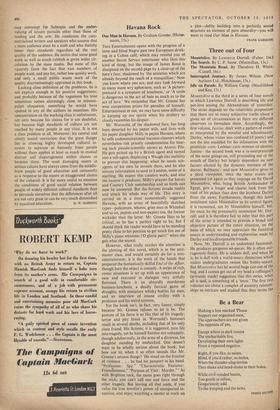Havana Rock
THIS Entertainment opens with the progress of a lame and blind Negro past two Europeans drink- ing in a Cuban café, which may remind you of another Secret Service entertainer who likes this kind of thing; but the image of James Bond is dissipated on the second page by a close-up of the hero's face, shadowed by 'the anxieties which are already beyond the reach of a tranquilliser.' Now you know where you are, and may look forward to many more wry aphorisms, such as 'A picture- postcard is a symptom of loneliness,' or 'A smile is dangerous to the act of hate as much as to the act of love.' We remember that Mr. Greene has won competition prizes for parodies of himself; Entertainment or not, we may have some difficulty in keeping up our spirits when his drollery so closely resembles his despair.
Mr. Wormold, of the shadowed face, has long been deserted by his papist wife, and lives with his papist daughter Milly in papist Havana, where he sells undenominational vacuum-cleaners which nevertheless risk priestly condemnation for bear- ing such pseudo-scientific names as Atomic Pile. He gets ,picked up by a British agent and turned into a sub-agent, displaying a Waugh-like inability to prevent this happening; when he needs sub- agents of his own he invents them, and he also invents information to send to London, some of it startling. He enjoys this creative work, and also the income it produces; Milly's prayers for horses and Country Club membership and so forth can now be answered. But the fictions invade reality and attack his whole way of life. This story is carried on in a most economically suggested Havana, with an array of beautifully sketched types—policemen, whores, grim men in Whitehall and so on, papists and non-papists too, the former wickeder than the latter. Mr. Greene likes to be critical, as he has a perfect right to be; but I should think the reader would have to be standing pretty dose to his position to get much fun out of Milly's pious whimsies CO gloria patri!' when she gets what she wants).
However, what really catches the attention is the plotting of this novel, which is in the past- master class, and would certainly do for a non-
entertainment; it is the work of the hands that prepared the fantastically skilful End of the Affair,
though here the object is comedy. A series of rich, comic situations is set up with an appearance of ease and executed in dialogue very artfully flattened. There is an absurdly murderous business-luncheon, a deadly farcical game of draughts, with miniature whisky bottles for men, and an interview of insane civility with a professor and his weird mistress.
Yet the book isn't, in fact, very funny, simply because Mr. Greene refuses to let it be. The posture of his farce is so like that of his tragedy; terror and pity break in. Wormold's humours result in several deaths, including that of his only close friend. His fictions, it is suggested, turn life into tragedy, yet he himself finishes not unhappily, though adulterously, in the arms of a divorcee, his daughter standing by unshocked. One doesn't want to be wholly serious about the book; but how not to, when it so often sounds like Mr.
Greene's serious things? 'He stood on the frontier of violence . . . he had his passport in his hand. "Profession : Spy." "Characteristic Features : Friendlessness." "Purpose of Visit : Murder." ' As with Brighton rock, the name goes right through
the stick; you can't call one end farce and the other tragedy. But leaving all that aside, if you value the true novelist's power of unexpected in- vention, and enjoy watching a master at work on a plot—deftly building into a perfeCtly sound structure an element of pure absurdity—you will want to read Our Man in Havana.
FRANK KERMODE


































 Previous page
Previous page